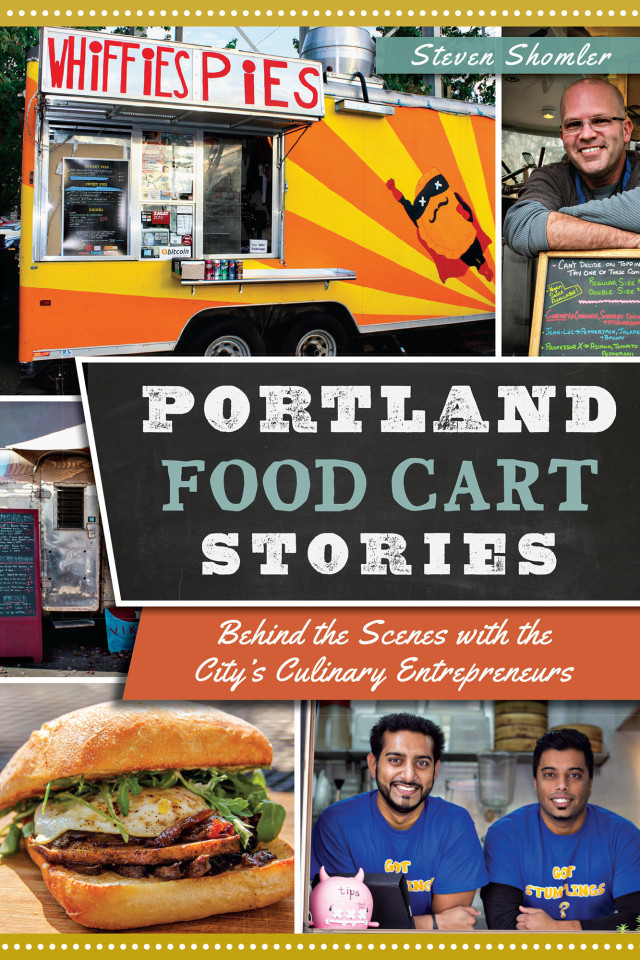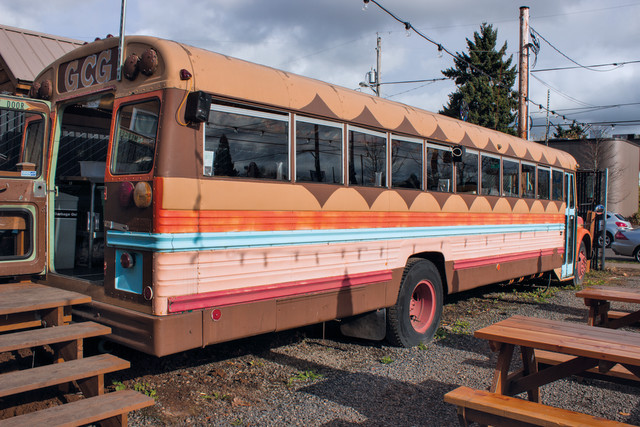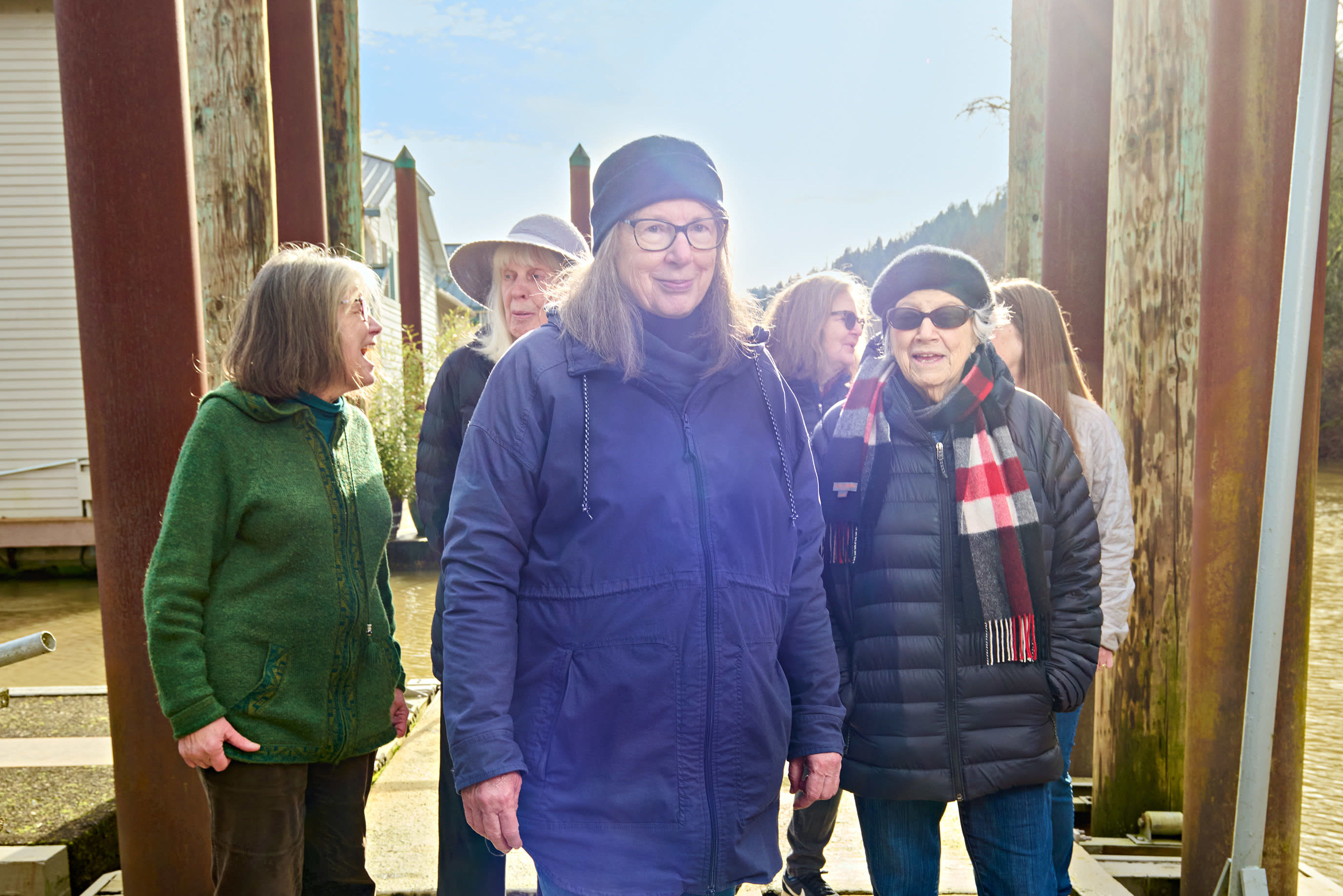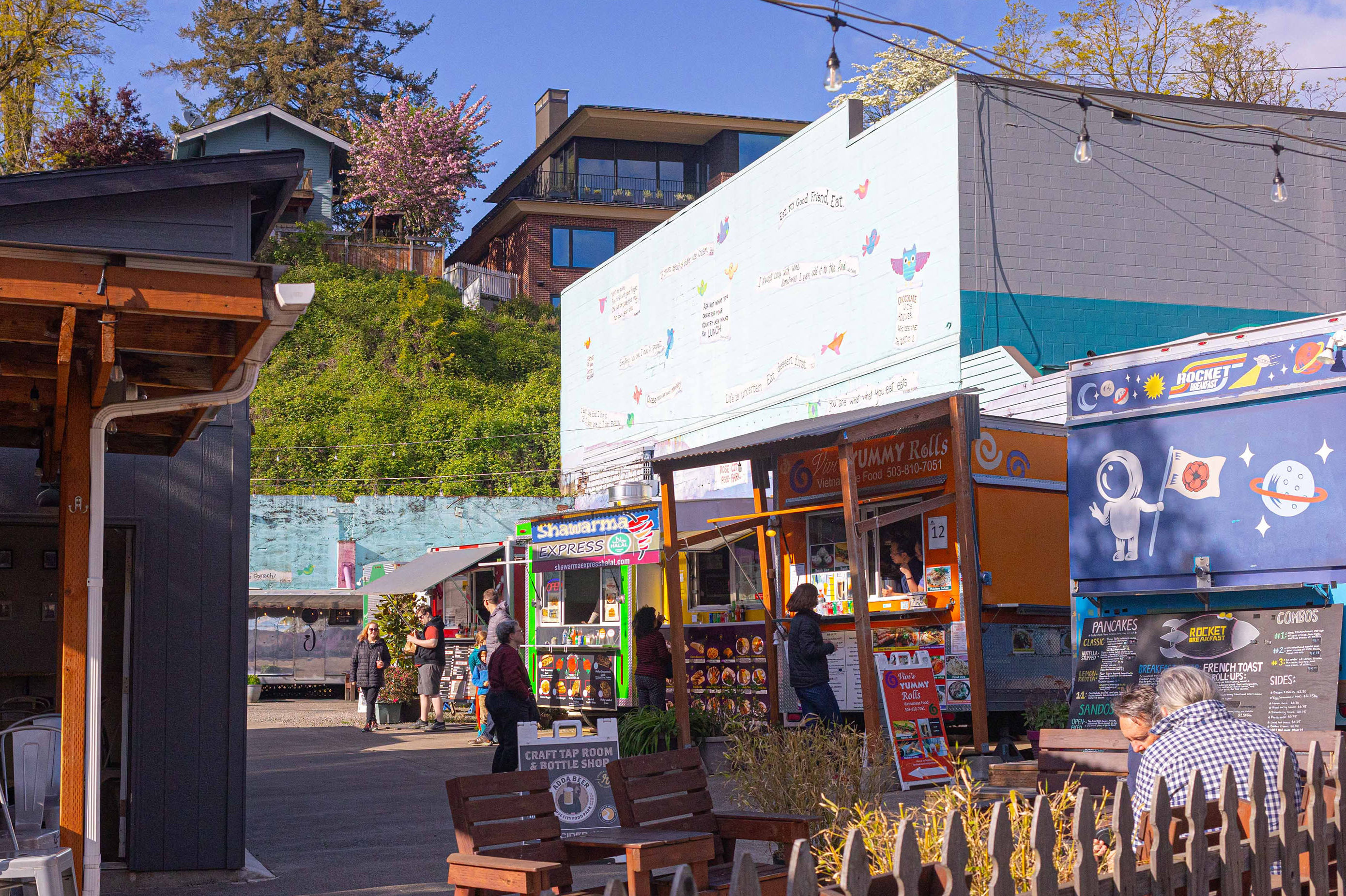New Book Explores Portland Food Cart Stories

Portland Food Cart Stories cover
Portland food cart aficionado and consultant, Steven Shomler, has just published a new book highlighting the stories behind some of the city’s most beloved food carts. In Portland Food Cart Stories (released April 15 from American Palate; $20; 189 pages) Shomler offers a user-friendly guide to local food carts and their place in Portland’s dining scene, then launches into the history behind 40 of the city’s favorite food cart entrepreneurs, including:
- The Grilled Cheese Grilled
- Potato Champion
- Tiffin Asha Food Cart
- Burrasca
- PBJ’s Grilled
- Yolk
- The Cheese Plate PDX
- Moberi
The stories in his book will make readers crack-up, break down, and cringe, all while bringing them closer to the chefs inside their favorite carts. At the end of each chapter, Shomler provides a “when you go” section, offering his suggestions for each cart’s most prized bites. If the chefs' stories aren’t enough to get you out carting, these curated recommendations will do the trick.

The Grilled Cheese Grill on Alberta
Image: Steven Shomler
We caught up with Shomler to find out what makes a successful mobile venture, how food carts impact the dining scene, and what we can learn from food carts that fail.
In the book you mention that you lived in Portland for 6 years before being dragged to your first food cart by a friend. What on earth took so long?
I moved to Portland in 2004 and for the first 6 years, every waking hour was going into my job. Being afflicted with a touch of workaholism, I kept thinking that I would enjoy Portland’s amazing food scene next week. I would buy Portland Monthly magazine and go to the restaurant section towards the back and circle the places I wanted to go to. But I never went. Stupidly, I worked too much those 6 years and did not really enjoy life or great food.
It sounds like you’ve made up for it these past few years by eating at nearly every food cart in the city. But if you had to choose just one cart to eat at for all the rest of your days in Portland, which one would it be?
What a horrid question! Part of the fun of going on food cart adventures is the variety–both finding something new and getting to go back to favorites you have visited many times before. If I were constricted to just one, it would have to be a food cart that had a seasonal menu, like Carte Blanche, The Cheese Plate PDX, Burrasca, or Retrolicious.
You’ve seen the array of Portland food cart dining options. Have you noticed any gaps that could be filled by aspiring carters?
You need to cook the food that that you love. You can’t just pick a cuisine that seems to be lacking in the Portland food cart scene go with that and expect to be success. People can tell when you are cooking food that you have a passion for and they can tell when you aren’t. Also, for your own sanity as a chef, you have to cook food you love because you’re working in a little metal box 10-12 hours a day with it.
Here’s a great example. One food cart chef, Jason Myers, recently closed down the Sideshow Eatery Food Cart and opened Rua in it place. I loved Sideshow – The Fancy Burger cooked in duck fat oil, topped with Gruyère, and white truffle mayo was amazing. Plus there were Duck Fat Fries…Oh baby, who is your big dog burger daddy?!? Sideshow was a huge success; however, Jason loves the cuisine of Vietnam and South East Asia and he needed to switch to the cuisine he loved. Rua is, of course, equally amazing because Jason is a gifted chef.
The food cart scene here in Portland is so dynamic. How do you think the book will fare once some of these carts close down and new ones emerge?
The tough thing about being a food cart fan is the harsh reality that your favorite cart is likely to close at some point in time. I still miss Ragin’ Cajun, which was the first cart I reviewed for Portland Food Cart Adventures. Just last week, I got the news that Viking Soul Food is going to cease being a food cart. I love Megan and Jeremy and it is an ache to me to think that they will no longer be at 42nd and Belmont. That being said, whether Viking Soul Food is a food cart or not, their story in my book is entertaining and thoughtful and people will enjoy it two or three years from now.
With that said, one advantage of the dynamic food cart scene here in Portland is that I will have plenty of material for Portland Food Cart Stories, Volume 2!
What do you see as the greatest benefits of Portland’s food cart culture?
There are many, many benefits to Portland’s food cart culture. Just ask Brett Burmeister, the managing editor of FoodCartsPortland.com, about the transformation that food carts help bring about at O’Bryant Square. Our food cart culture is also an amazing small business incubator and school. Even when carts go out of business, the people who started those carts take the start up lessons they learned with them into their new ventures.
What about any downsides to the food cart culture here in Portland?
I am honestly not aware of any downsides to Portland having a vibrant food carts scene. Portland as a whole is better off because we have embraced them. Portland’s restaurant scene is also much better because of our acceptance of food carts. One word proves that – Lardo. With that said, I have heard people say that food carts hurt restaurants. I think these people are just being small-minded. Dining in a restaurant is a very different experience from a food cart. When I want a restaurant experience, I go to a restaurant. Look at Donald, the owner of Toast on SE 52nd. He opened a food cart, Yolk, right by his restaurant. He wasn’t worried about it “hurting” his restaurant business.
One thing I loved the most about the book is that it’s ultimately a collection of stories that encourage readers to follow their dreams. But there’s also a bit of a selection problem in that the featured stories only draw on the successful cases. Did you talk to any unsuccessful cart owners in doing your research for the book? What can we (and aspiring food cart owners) learn from them?
I featured successful carts in my book because people who battle for their dream and succeed inspire me. But there are, of course, unsuccessful carts. I call it “Dead Cart Walking” when I see food carts that are not going to make it. They’re dead and just don’t know yet.
Here are two things all of us can learn from food carts that fail:
(1) Pay the price: Anyone wanting to accomplish something needs to be ready to pay the price needed to succeed in that endeavor. Sadly, people often start something without even knowing the price. Count the cost of operating a food cart, especially in the slower months of winter, before you start. People also don’t seem to always know the crazy number of hours they’ll have to work in their first year. Know the price (both in dollars and time) before you start your endeavor and make sure that you are willing to pay it.
(2) Branding and marketing matters: Figure out your brand story and be prepared to do your own marketing. The beauty of social media is you can use it to tastefully tell your brand story and build a fan base. Someday maybe you’ll be able to afford other kinds of marketing. Social media doesn’t cost money, only time. I get pissed off when people who are trying to start a business tell me that they don’t have time for social media. If you don’t have time for social media, be prepared to fail.




